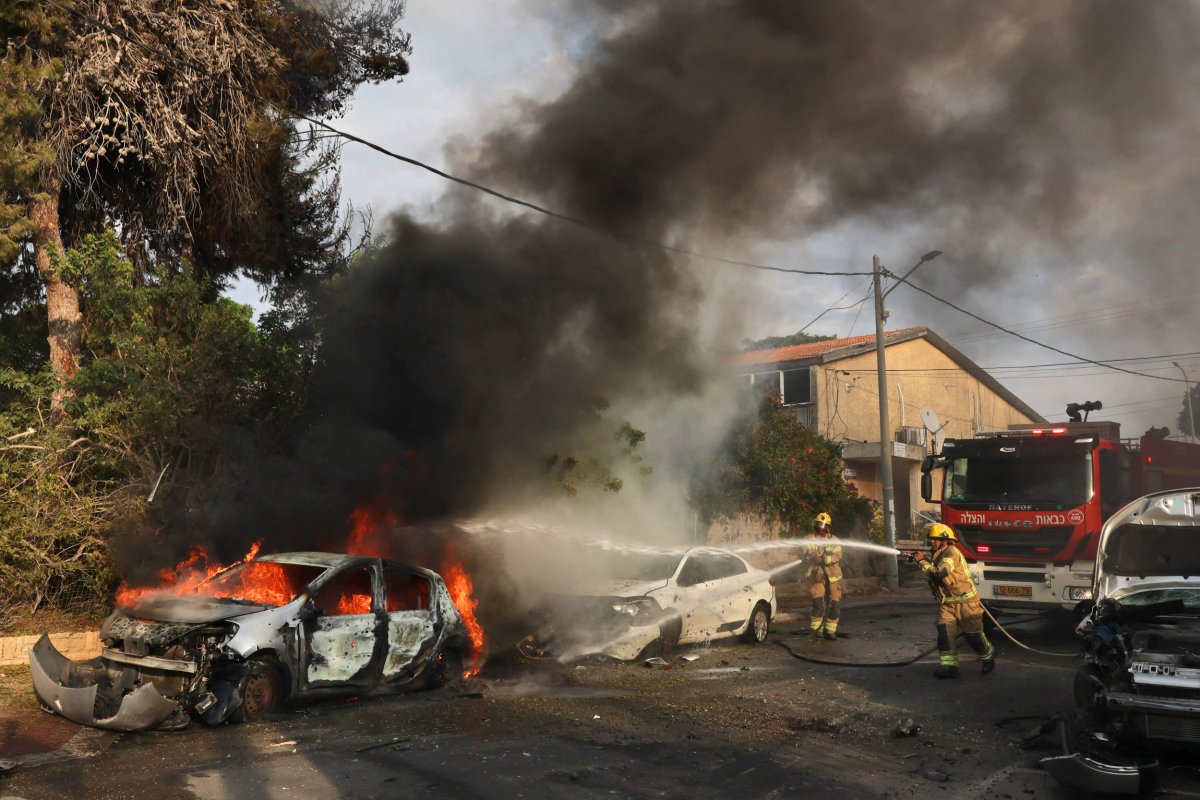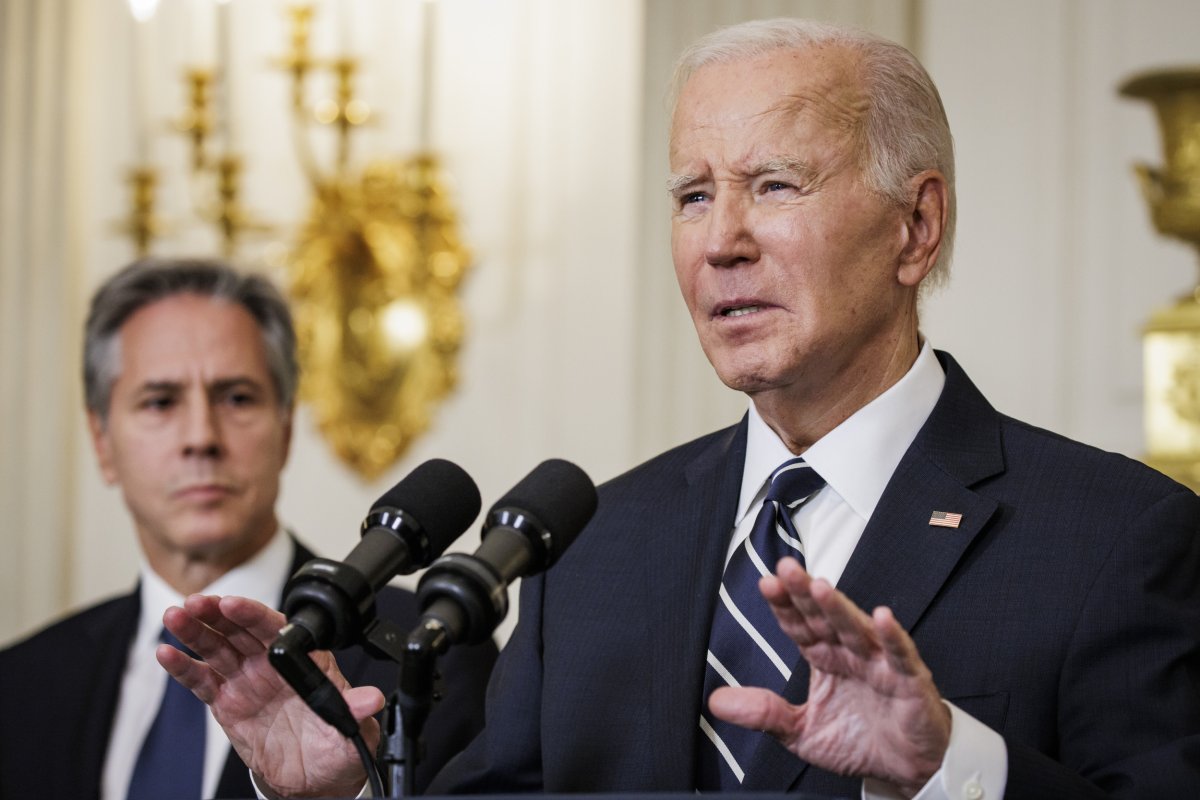DANIEL BUSH
Hamas's devastating attack on Israel has forced the White House to face the prospect of a potential regional war that would consume the administration for weeks or months to come, a worst-case foreign policy crisis for President Biden as he ramps up his reelection campaign.
And as the death toll rises, other factors beyond a broader escalation -- from a developing hostage situation to oil price rises that would increase inflation and cause economic harm -- may present Biden with challenges that would have significant political ripple effects in the United States.
A broader war in the Middle East may not come to pass. But as details of the planning behind the attack start to emerge, and as Israel prepares a full-scale assault on Hamas in the Gaza Strip, officials in Washington are bracing for the possibility that the violence might escalate.
"The nightmare scenario for the Biden administration is that before this is contained it metastasizes and Israel has a multifront war on its hands," Lucy Kurtzer-Ellenbogen, the director of the Israeli-Palestinian Conflict Program at the United States Institute for Peace, told Newsweek.
Whether the war expands will depend in part on any role Iran may have played in helping Hamas plan the attack, former U.S. intelligence and defense officials and others told Newsweek. Iran and allies such as Hezbollah could also escalate the conflict as the Israeli army steps up what it has promised will be a massive operation in Gaza.
The Wall Street Journal said Iranian security officials had helped plan Hamas's attack. But Iran has denied any involvement, and American and Israeli officials have said they have not yet seen enough evidence to link Tehran to the attack.
"If the Israelis really do establish a firm belief that Iran had more of a hand in this, Israeli strikes into Iran would become a real possibility," Michael Leiter, a former director of the U.S. National Counterterrorism Center, told Newsweek.
Hezbollah clashes
Clashes along Israel's northern border after Hamas launched its attack Saturday also raised concerns that Hezbollah, the Iranian-backed Lebanese Islamist militant group, might be drawn into the fighting.
"Iran is the hidden hand here," Danny Sebright, president of the U.S.-U.A.E. Business Council and a former United States intelligence official, told Newsweek. "This is one of those situations where things can quickly spiral out of control."

Around 900 people in Israel and more than 680 in Gaza have been killed since Hamas launched the initial attack Saturday, according to the Associated Press. Among the dead are at least 11 Americans, Biden said. Thousands more have been injured in what Israel has described as the deadliest attack on its soil in the nation's 75-year history.
The breadth of the wider risks came into view over the weekend and Monday as Biden huddled with senior advisers at the White House following the developments unfolding in Israel and Gaza.
"This is a complete surprise to everyone at the White House. It's caught everybody off guard," said one person who was familiar with the matter but asked not to be named to offer a frank assessment of the White House reaction.
Hamas is also believed to be holding roughly 150 people hostage. Israel Defense Forces officials believe the actual number is likely higher, according to one person who received an intelligence briefing from the IDF and asked not to be named.
There is little information on the hostages, including their nationalities or where they are being held by Hamas. But the hostages are believed by U.S. officials to include some U.S. citizens, a development that will put pressure on the White House to act to secure their release.
The situation has already drawn early comparisons to the Iran hostage crisis, which unfolded over a 444-day period after supporters of the Iranian Revolution took over the U.S. embassy in Tehran in 1979 and held 52 Americans hostage. Public anger with President Jimmy Carter for failing to free the hostages contributed to his loss to Ronald Reagan in the 1980 presidential election.
The parallels are imperfect, but experts said that Biden may face similar political pressure to secure the release of Americans being held by Hamas to avoid the kind of drawn-out hostage crisis that helped sink Carter's bid for a second term.
And while foreign policy may not generally decide U.S. elections, the possible economic impact of the conflict for voters became evident on Monday as oil prices jumped because of the tensions.
Peacemaking in Crisis
Hamas's attack on Israel has also thrown into question the administration's push to reshape the Middle East through diplomatic accords, without first making meaningful progress to resolve the Israeli-Palestinian conflict.
"There is no such thing as peace in the Middle East unless you address the Israeli-Palestinian conflict," Jeremy Ben-Ami, the president of the influential liberal advocacy group J Street, told Newsweek. "It's not going to be swept under the rug."

President Joe Biden speaks on the terrorist attacks in Israel alongside Secretary of State Antony Blinken from the State Dining Room at the White House on October 7, 2023.
The timing of the attack by Hamas was likely intended to make it harder for Israel and Saudi Arabia to complete a deal to normalize relations, said Shadi Hamid, a longtime expert on the Middle East. But it also reinforced the notion that the Biden administration has been "asleep at the wheel" in developing a coherent Middle East strategy, Hamid said.
"The Biden administration sees the Middle East as a nuisance," Hamid told Newsweek. The attack by Hamas "for them is a real distraction from what top Biden aides want to focus on, which is great power competition, dealing with China, and obviously the Ukraine conflict."
After the attack, Biden vowed "rock solid and unwavering" support for Israel. The White House released a joint statement Monday in which Biden and the leaders of France, Italy, Germany and the United Kingdom condemned the attack.
"We make clear that the terrorist actions of Hamas have no justification, no legitimacy, and must be universally condemned," the leaders said. "Our countries will support Israel in its efforts to defend itself and its people against such atrocities. We further emphasize that this is not a moment for any party hostile to Israel to exploit these attacks to seek advantage."
The violence in the Middle East has sparked protests around the world, and there are signs it is already seeping into U.S. presidential politics.
Former President Donald Trump, the 2024 Republican frontrunner, and other Republicans have seized on the Hamas attack in recent days to criticize Biden for not doing more to support Israel and on his policies toward Iran.
The U.S.-Israeli relationship has long divided Democrats. Those tensions between progressives, who are critical of Israel, and more centrist Democrats have been evident in recent days.
But support for Israel is a rallying cry for most Republicans and may resonate especially with conservative evangelical Christians, Robert Blizzard, a Republican pollster, told Newsweek.
The fighting in Israel may reinforce a perception among American voters that Biden is presiding over a period of strife and conflict, Blizzard said, both abroad in the Middle East and Ukraine and at home, where Congress has been paralyzed by debates over government spending and the race for House speaker.
"Adding all of this up, it just feeds into this narrative that things are certainly out of control and there's a lack of strong leadership from the president. That's a real problem for Biden," Blizzard told Newsweek. "When there's chaos it's usually not good for the incumbent."
No comments:
Post a Comment